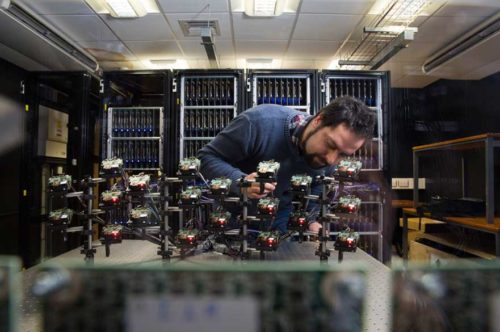If you don’t quite have the right qualifications to start our Electrical and Electronic Engineering degree, you could opt to start your studies with a foundation course in electrical and electronic engineering.
You’ll study introductory modules relevant to the degree course whilst developing key skills for academic study. Successful completion of the introductory foundation year will allow you to progress onto the degree in Electrical and Electronic Engineering.
As the electronics industry continues to grow worldwide, the demand for electrical and electronic engineering graduates is high. This Electrical and Electronic Engineering qualification offers a healthy balance between theory and practice, with the aim of producing graduates who can play leading roles in industry.
We combine technical engineering with management and business skills, and cover a broad area of this subject discipline, including embedded computing, power, electrical, electronic and communications engineering.
What you will study
Years one and two provide essential knowledge and skills to prepare you for the final years of the course. Areas of study include analogue and digital electronics, embedded systems, mathematics, power, machines and control, and signals and digital communications.
Lectures are strengthened by hands-on laboratory assignments, which use a range of modern software tools with practical hardware systems. This allows you to realise the theory in a practical way. Group and project work throughout the course will reinforce teamwork and develop transferable skills.
In your final year, you will cover electronics design, control system design, power electronics and drives, telecommunications and embedded systems design. You’ll also undertake a major practical project.
Foundation Year: Electrical and Electronic Engineering degree
The Foundation Year will give you a good understanding of our engineering courses and provide you with a good numerical background to support you throughout the remainder of the degree. Following your initial foundation year, you will progress onto the modules studied as part of your award.
- Foundations of Mathematics – 20 credits
- Further Foundation Maths for Engineers – 20 credits
- Essential Engineering Skills – 20 credits
- Engineering Project – 20 credits
- Foundation Engineering Principles – 20 credits
- English for Engineering (optional) – 20 credits
- Electrical Science (optional) – 20 credits
Year One: Electrical and Electronic Engineering degree
- Mathematics for Engineers – 20 credits
- Electrical Principles – 20 credits
- Engineering Applications – 20 credits
- Introduction to C programming and Embedded Systems – 20 credits
- Analogue and Digital Electronics 1 – 20 credits
- Health Safety and Professional Development – 20 credits
Year Two: Electrical and Electronic Engineering degree
- Analogue and Digital Communications – 20 credits
- Power, Machines and Control – 20 credits
- Electrical Principles and Analytical Methods – 20 credits
- Configuration and Programming of Embedded Systems – 20 credits
- Analogue and Digital Electronics 2 – 20 credits
- Group Project and Management for Engineers – 20 credits
Year Three: Electrical and Electronic Engineering degree
- Communication Engineering and Application – 20 credits
- Control System Design – 20 credits (Optional)
- Power Electronics and Drives – 20 credits
- Advanced Embedded Systems – 20 credits (Optional)
- Electronics Design – 20 credits
- Singleton Project and Project Management (40)
- Supervised Work Experience (SWE) – 120 credits
Zobacz więcej na stronie uniwersytetu >>
Wiza studencka do Wielkiej Brytanii
Aby studiować w Wielkiej Brytanii potrzebujesz wizy studenckiej. Aby złożyć wniosek o taką wizę studencką musisz zdjać certyfikat językowy na poziomie B2.
Uważaj! Do celów wizowych musisz wybrać wyłącznie egzamin w wesji Secure English Language Test (SELT) UKVI .
Co to jest test SELT UK VI registration? Przeczytaj więcej o testach SELT UKVI >>




















